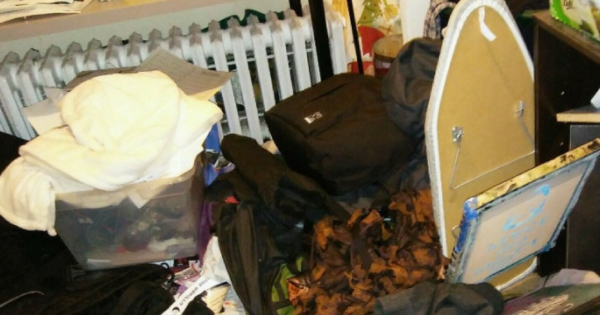State tactics work by isolating activists; the Dead City Legal Posse is holding them together.
By Malcolm Harris
Police and demonstrators clash in downtown Washington, D.C., following the inauguration of President Donald J. Trump. (Photo: Spencer Platt/Getty Images)
On the morning of the first Tuesday of April, activist Bob Atwood (not his real name) woke up to insistent banging on the door of his home in the Petworth neighborhood of Washington, D.C. By the time he got there, the Metropolitan Police had already let themselves in, busting through the door with guns out and riot shields up. They grabbed Atwood, handcuffed him, and sat him on the couch while they tore up his place for an hour and a half. The police piled all his electronics into boxes and left. Atwood hasn’t heard from them since.
If Americans remember anything about the January 20th presidential inauguration of Donald Trump (besides the punch heard ’round the world), it’s probably that the crowds didn’t quite live up to expectations. Even as the big guy claimed he had the biggest audience ever, aerial pictures told a different story, and we all got a good laugh. For some activists, however, January 20th never really ended. The stench of repression still hangs in the air long after the last tear gas has dispersed.
Repression works in part by isolating activists, using the courts to turn collective problems back into individual cases.
The pictures of a sparsely filled mall no doubt reflected a lack of enthusiasm for Trump within the population of the D.C. area, but that angle undersells the work of left-wing activists who executed a well-planned series of blockades, closing off many of the entrances for the duration of the inauguration ceremonies. The protest, hashtagged #J20 for the date, was as successful an action of that size as I’ve ever seen, but the police response was unexpected as well. For the first time in a decade, the D.C. police mass-arrested hundreds of protesters, and, for the first time that anyone I’ve spoken with can remember, the arrestees were mass-charged with felony riot. A few of those cases have been dropped, but the rest — over 200 — have been indicted by D.C. grand juries. Now the prosecutors have to decide if they can make their cases to trial juries, which I guess is what the raid on Atwood’s house was about. I’ve taken a look, and the warrant doesn’t say.
Atwood hasn’t been charged with any crimes in connection with J20, and the warrant doesn’t indicate that anyone has even accused him of any wrongdoing. It authorizes the police to search for anything that might be related to the planning of a “Black Bloc” protest on January 20th, and to seize it as potential evidence. “Every week I wake up wondering if this is the one when I get charged,” he says. “It sucks.” The raid shook him up, he says, and has left him pretty stressed out.
“It’s scary,” Atwood says. “One minute the police are just there, and you’re alone face-to-face with the power of the state.” Repression works in part by isolating activists, using the courts to turn collective problems back into individual cases. It’s an effective strategy, and it’s hard to combat, especially if the authorities are willing to spend the kind of time and money needed to prosecute almost 200 separate felonies.
That’s where the Dead City Legal Posse comes in. Activists in D.C. are used to busloads of protesters coming in from out of town, and, as part of their hosting duties, the J20 organizing committee promised to provide support for all arrestees for the duration of their cases. Based on past experience, that was supposed to be a weeklong commitment at most. One successful protest later, organizers had to choose between going back on their word and supporting hundreds of arrestees through legal processes that could take years. They picked the latter, and the J20 legal working group reformed as the all-volunteer Dead City Legal Posse.

Scene of the raid. (Photo: Dead City Legal Posse)
I spoke with Legba Carrefour, a longtime D.C. activist and one of the 10 core members of the Legal Posse, about how the group came to be and how it works. “We said we’d be there for people,” he says, “so after the arrests, we were like, ‘Fuck, I guess we gotta do it.’”
Carrefour offers court support, which is one of the Posse’s crucial functions. A volunteer attends every hearing for every J20 arrestee; they check in with the defendant, offer food, coffee, and cigarettes; make sure everything is copacetic with their lawyer; and see if they need reimbursement for travel expenses. Then the volunteer takes notes on the hearing itself, which get filed for reference and the historical record. By meeting with all the arrestees, the Legal Posse is hoping to counteract the state’s strategy of separating individuals from the other people with whom they risked their freedom. “It’s important work to keep people connected,” Carrefour says. “It also makes them less likely to snitch, which is better for them, and for everyone involved.”
“I don’t think people understand how much work goes on behind the scenes. A lot of what activists do has to be about taking care of people.”
The Dead City data team tracks the progress of the arrestees as they move through the court process, making sure nobody falls through the cracks in the system. They coordinate with the National Lawyers Guild to ensure everyone is represented. Activism can be very dangerous, especially if you don’t have someone on the ground looking out for you. American defendants are entitled to legal representation, but having a lawyer is not the same as having legal support. The Dead City Legal Posse wants to be there to do everything the lawyer doesn’t do. “These are my friends,” Carrefour says, “and if we expect people to come out and put themselves on the line, then we need to have their backs.” That job ended up being a lot bigger than anticipated, but they’re approaching it with seriousness — and with anarchist good humor.
Right now the Legal Posse is just focused on the inauguration arrestees — and their hands are certainly full. But the repression has been so broad and intense that just providing support for the single day’s actions entails building up infrastructure that activists say might be put to additional use later. Either way, by the looks of things, they group is going to be around for a while.

(Photo: Dead City Legal Posse)
Dead City has put up a well-designed website with FAQs and weekly updates; its first fundraiser is a T-shirt with a snowflake motif— a play on a now-common right-wing anti-protester jeer. “I don’t think people understand how much work goes on behind the scenes,” Carrefour says, “A lot of what activists do has to be about taking care of people.” In the Trump era, that necessity is taking concrete form, and there are similar legal support groups sprouting up around the country.
The general public sees activists in fits and spurts: One day protestors are flooding the streets chanting slogans, punching Nazis, and breaking windows, the next they’re nowhere to be found. But, as J20 has shown, for every minute of running in the street on television, there are hours of washing dishes in church basements and standing outside courthouses with water and apples. The repression of protest has real and present costs: in money, time, and emotion. Activists singled out by the state shouldn’t be left to pay on their own.





